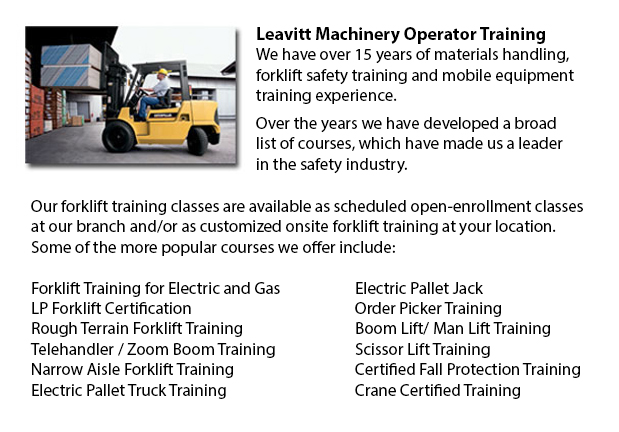
Saskatchewan Forklift Training Classes - Lift trucks are a type of heavy lifting equipment made use of to handle and move material safely and efficiently. Occasionally called Lift Trucks, they are utilized in a variety of businesses. Personnel working with and around forklifts should be trained to recognize hazards connected with the utilization of forklifts.
We provide training classes known as Safe Operation of a Forklift. The classes provide instruction in the theory part of becoming a lift truck operator. Trainees would learn their legal responsibilities as forklift operators. Upon completion of the classes, a printed certificate would be given. The certificate has to be signed by an individual qualified to verify that a hands-on evaluation has been finished in the workplace of the trainee.
Forklift Safety
Lift trucks are used extensively in industrial work environment due to their ability to transport and lift heavy loads. These industrial equipment are essential and indispensable for a lot of groups, nevertheless they could be dangerous if utilized by employees which is not properly trained. Lift truck injuries, when they occur, tend to be serious because of the power of these heavy equipment. Workers who work often around forklifts can become complacent and forget about the dangers. Important operating and maintenance measures might be ignored.
Lift truck training is needed for new workers, but all operators need to undergo periodic re-training. First aid training is likewise vital.
Daily inspection procedures are of critical importance. Lift trucks can become damaged if they are not inspected on a regular basis. Before being utilized, forklifts should be visually checked as to their general condition. An operational inspection should be done in order to determine the machinery is working correctly. The supervisor must be informed if anything is noted which can affect the safe utilization of the lift truck.
Inspections must involve inspecting the work area to make certain it is clear of things that could be a problem. Overhead objects and obstructions should be checked as well. It is vital to have a working fire extinguisher accessible and available. Different levels should be inspected, like fuel, radiator water, engine oil, and electrolyte levels in cells. Cables, plugs and batteries must be checked. Clean out vent caps and make certain that bolts, nuts, guards, chains, and hydraulic hose reels are not damaged, missing or loose. A tire inspection will ensure that wheels are not damaged or worn. Pneumatic tires would need a pressure inspection.
-
Saskatchewan Forklift Training School
Saskatchewan Forklift Training School - Forklift Training School - Federal and industry regulators have established the criteria for forklift safety training according to their current standards and regulations. Those wishing to operate a forklift sh... More -
Saskatchewan Scissor Lift Ticket
Saskatchewan Scissor Lift Ticket - The scissor lift truck has been a great benefit to many businesses since the effort and manpower to run one of these machines is very minimal. Furthermore, numerous workplace injuries have been avoided by having one... More -
Saskatchewan Crane Operator Classes
Saskatchewan Crane Operator Classes - For the supervisors and the operators, new and current, the crane operator training course is suitable for all. Course content addresses relevant provincial, state and federal safety regulations. The first part o... More -
Saskatchewan Manlift Training
Saskatchewan Manlift Training - There are many manlift training courses that offer a review of the manlift equipment. The practicum part of the training is another important portion of the program. In this section the trainee has chance to demonstrat... More -
Narrow Aisle Forklift / Order Picker Training / Electric Pallet Jack / Electric Pallet Truck Training in Saskatchewan
A pallet lift is a device built principally for moving pallets of irregular weights and sizes. They can be used in conjunction with cranes, platform lifts and other heavy duty machines as an appendage piece or to be used on their own. Pallet hoists a... More -
Saskatchewan Telehandler Training Courses
Saskatchewan Telehandler Training Courses - The employer has the responsibility to make certain that their employees are trained to work proficiently using telehandler machinery. The personnel should be assessed for their ability to utilize the equip... More -
Saskatchewan Heavy Equipment Training Schools
Saskatchewan Heavy Equipment Training Schools - There are many heavy equipment training schools to pick from. If you want to get to the best, it is important to check several factors of the school to be able to ascertain the level of education you wi... More -
Saskatchewan Crane Training Schools
Saskatchewan Crane Training Schools - We have designed numerous Mobile Crane Operation programs at our Crane Training Schools. These programs are recommended for the skilled operator who needs re-certification or certification, and for inexperienced... More

Forklift Certification Saskatchewan
TOLL FREE: 1-888-254-6157
Regina, Saskatchewan
forkliftcertificationsaskatchewan.com
Email Us
About Us


